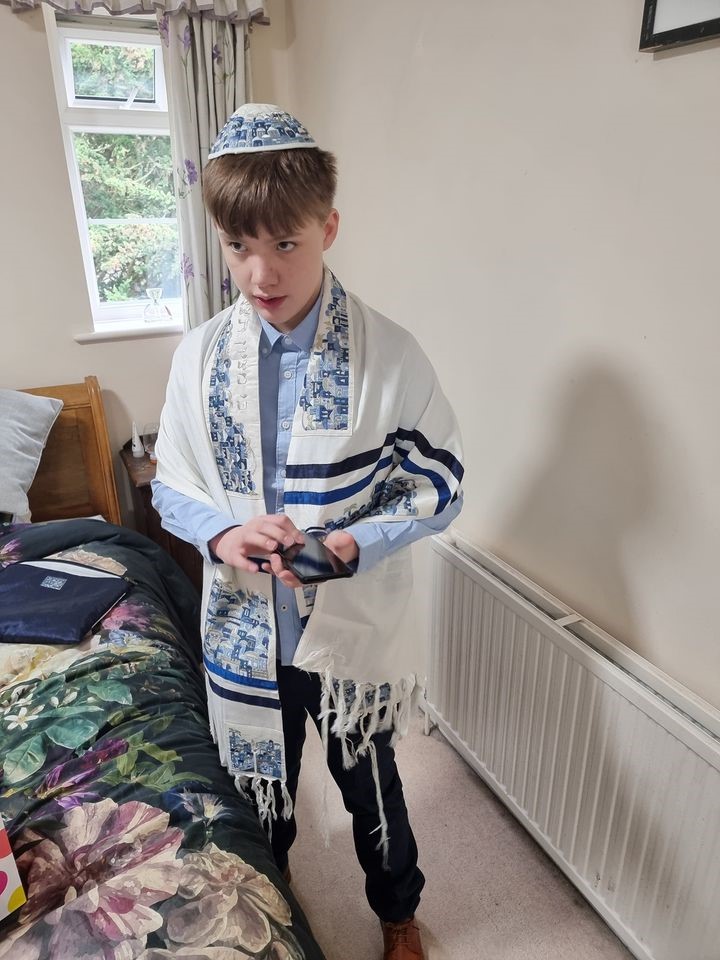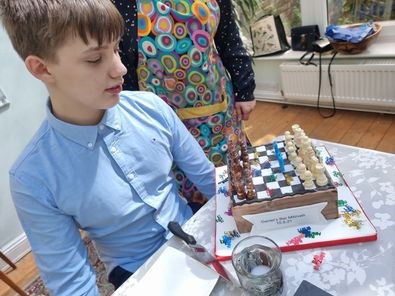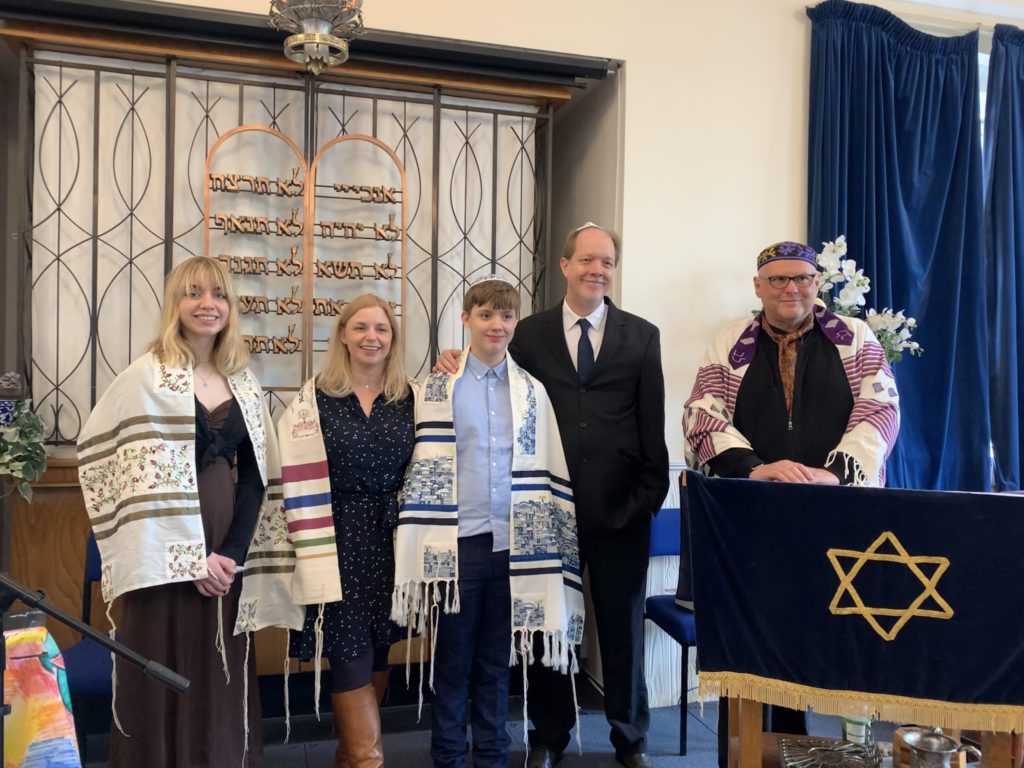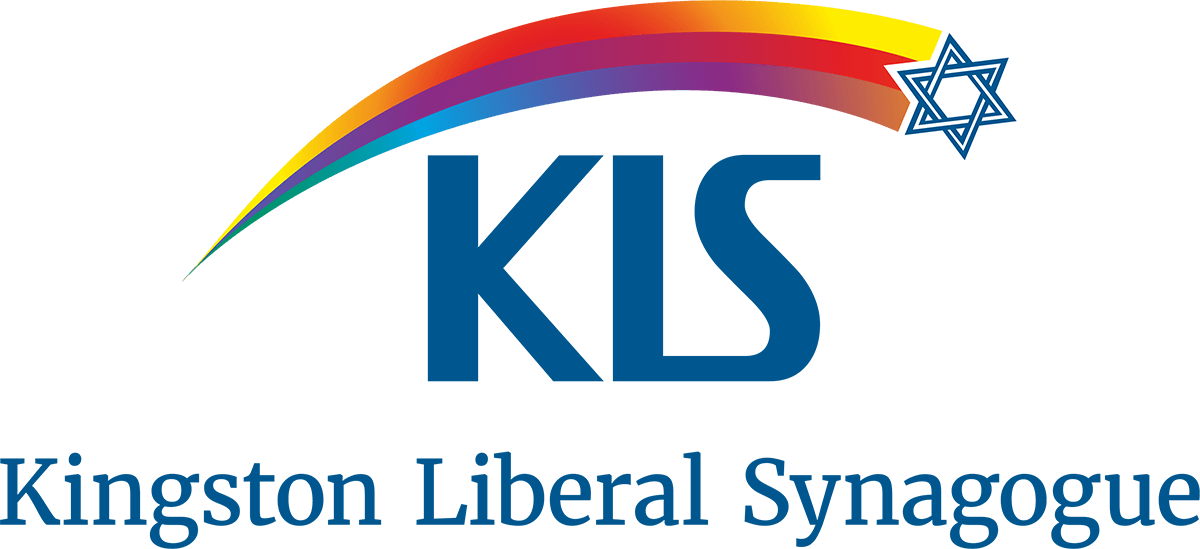Guest post from KLS member Adam Roberts about his son Daniel’s Bar Mitzvah
On May 15th my son Daniel became Bar Mitzvah. His Torah portion was Parashat Shemot chapter 3:1-8, where Moses encounters the burning bush. His birthday was actually in December, but all the upheavals of this last Covid-y year meant that the Bar Mitzvah had to be delayed.
I’m not Jewish, but my wife Rachel is and that’s how we have raised our two kids. Indeed Dan’s day kept reminding me of his big sister Lily’s Bat Mitzvah, six years earlier. Learning her Torah portion seemed to take ages, where Dan practised and learned his quickly and well. Conversely, Lily appeared confident and assured as soon as she stepped onto the bimah; Dan, like many thirteen-year-old boys, was a little diffident at the prospect of public speaking.
I was struck as if for the first time by how tall he has become
We arrived at KLS early on the morning of the 15th to give us time for a quick dry-run of the service, and at first Daniel looked a little stiff and ill at ease. It is a big deal, after all! But Rabbi René gave him some advice on how to project his voice and to vary his intonation to keep the readings interesting. By the time the actual service began he looked much more comfortable. Indeed, sitting in the front row I was struck as if for the first time by how tall he has become, and how handsome he looked in his smart trousers, new shirt, posh shoes and his beautifully embroidered tallis.

Lockdown restrictions meant that only a small group could attend in person, but many more followed the service via Zoom. And after all the preparation and anxiety and practice, Dan led the service really well and read his portion flawlessly. We were all immensely proud of him.
An inadvertent heckle…..
The Zoom connectivity worked well, although at one point in the service one of the remote-attendees took a moment out to call his local library to renew some library books for his young daughter, forgetting as he did so to mute his microphone, which meant that his words echoed through the synagogue. Rabbi René fielded this inadvertent heckle with aplomb. And after all, isn’t every Bar Mitzvah centred on a book, the Torah? Books are important.
There was no Kiddush afterwards, thanks to Covid, but we had a small family party for Dan when we got home, including a cake themed to his current passion, chess.

My heart did leap up to see my beautiful boy standing on the bimah
During the service there were readings from Dan’s grandfather and from his aunt, as well as one from his sister Lily, who had come down from Edinburgh—where she is at university—especially for this day. I also gave a reading, and I’d like to say something about it here. I chose this short poem by English Romantic Poet William Wordsworth:
My heart leaps up when I behold
A rainbow in the sky:
So was it when my life began;
So is it now I am a man;
So be it when I shall grow old,
Or let me die!
The Child is father of the Man;
And I could wish my days to be
Bound each to each by natural piety.
Why did I choose this poem? I teach English Literature at Royal Holloway, University of London, and specialise in the Romantic and Victorian periods, and this is one of my favourite pieces of Wordsworth. It seemed to me a fitting piece of verse for an occasion like Dan’s Bar Mitzvah, a day after all of joy and celebration. And my heart did leap up to see my beautiful boy standing on the bimah, leading the service and marking this important time in his life with all his friends and family around him.
What we think and feel as children, the way we live and love and are loved, shapes the kind of adult we become
But there is something else in this poem which seems to me beautiful in way that is profound, actually, and that is the line: the Child is father of the Man. I think Wordsworth means several things by this line. One is a simple chronological truth: we are children before we become adults—this is the very transition that the Bar Mitzvah celebrates of course—and what we think and feel as children, the way we live and love and are loved, shapes the kind of adult we become. Dan has always been a kind and clever kid, with a rich sense of humour, and it’s wonderful to see those things developing as he grows into maturity.

Children have access to a wisdom that we adults have mostly forgotten
And there’s another meaning in that line, a meaning that actually reverses the linear, chronological sense. Because Wordsworth is saying that we get things the wrong way round when we assume the father is the father of the child. We might think that a parent, because older, is wiser; that the child should listen to them, learn from them and take their lead from them. And in some senses of course this is true; there are lots of things adults can teach kids, in the family and in school. But Wordsworth believed that in the most important sense the line of connection runs the other way. Children have access to a wisdom that we adults have mostly forgotten, or have become alienated from, worn down and exhausted by all the demands of adult life—and this last Covid-afflicted year has been exceptionally wearing and exhausting for all of us. Children are alive more spontaneously and immediately than adults. They are closer to joy (and sometimes to sorrow) and they experience that joy more intensely. Children understand the importance of play and friendship, of love and delight, things equally vital for adults and yet things we are often distracted from, things we can lose from life. Wordsworth believed that we should defer to children, that a father (like me) has as much to learn from his son (like my Dan) as the son has to learn from the father, and that the things Dan can teach me are more vital and more important, actually, than the kinds of things I can teach him.
We should keep alive within us the children that we once were
So the Child is father of the Man means: the child comes first and we should learn from him or her. And it also means that we should keep alive within us the children that we once were—piety is, perhaps, a rather worthy-sounding, musty kind of word nowadays, but Wordsworth means something bright and sustaining by it, something rooted in the natural world and its beauty as well as in the rituals and continuities of community. This natural piety is what will keep his childishness alive within his adult life, and to keep alive that light of wonder and joy, that rainbow splendour, that animates our early years.
I hope Daniel never forgets his younger self as he grows into adulthood. And I hope that I never forget that, just as I am his father, he has an unforced, natural priority, a kind of fatherhood, over me, a wisdom from which I can always learn. As a non-Jew, being married to Rachel and watching my two children grow up as Jews has been a learning experience. One thing I have always admired about Kingston Liberal Synagogue is the way it has been such a supportive community in which Dan can find community, belonging, friendship and love. It was a special day.
